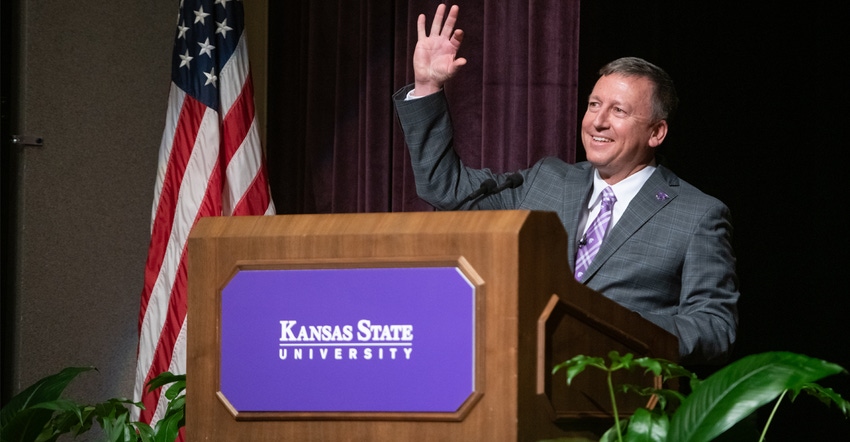
The new president of Kansas State University is no stranger to the agricultural mission of a land-grant university. You might say Richard Linton has been working toward this post for his entire career.
Kansas Farmer sat down with Linton, who will leave his current post as dean of the College of Agriculture and Life Sciences at North Carolina State University and begin his work as president of K-State Feb. 14. Here are five things you need to know:
1. Linton brings a solid food and agricultural background to the job. He has a bachelor’s degree in biology, master’s degree in food science, and doctorate in food science from Virginia Tech. He was the founder and director of the Center for Food Safety Engineering and associate director of agricultural research programs at Purdue University. He was the department chair of food science and technology at Ohio State University before accepting his current position with N.C. State.
“I’ve been preparing for this opportunity my entire professional life,” he says. “I’ve very strategically worked through multiple land-grants [universities] to try to learn different ways to approach challenges and different best practices. And the goal here is to be able to take that learning and to be able to meld it into the culture at K-State.”
2. He’s seen strategic planning work in action while at N.C. State. And he’s looking forward to implementing K-State’s newly rolled out Economic Prosperity Plan for the state’s stakeholders.
“I would hope there are ways in which we could improve and have a better quality of life for the farmer,” Linton says. “That there could be opportunities for more yield and profitability for their operation. That there’s a better workforce and talent pipeline that’s coming from Kansas State University, to be able to help our ag industry.” The key to its success will be partnerships with stakeholders and industry as well as university researchers, he adds.
3. Fostering cross-college collaborations can be good for the university and its stakeholders, Linton says. And he’ll continue that as president of the university.
“Fostering cross-college interactions can be incredibly synergistic, and can provide results that are not possible doing it alone,” he says. For example, hiring data analysts from one college to work in research in the college of agriculture can and will stimulate research funding opportunities, and he adds, it will ultimately result in innovative technology and solutions that will improve the profitability of Kansas farmers and ranchers. That’s just one example, and he says he’s looking forward to working with K-State personnel to find more cross-college synergies.
4. Linton says creating an environment at the university where diversity is encouraged is ultimately helpful in meeting the land-grant mission. That environment attracts strong faculty and researchers, with innovative ideas. It attracts students and energizes them to find answers.
“If you think about the basic definition of a land-grant university, it’s a place of learning for the people for all of the people,” he says. “And land-grants are an ideal place to bring in people from all facets of life with different backgrounds, disciplines, expertise and ideas. And when you have a very diverse group that looks into agriculture’s grand global challenges, you get much more thoughtful solutions.”
5. Linton and his wife, Sally, are parents of Lily, a senior in high school, and Chris, a sophomore in high school. They’ll be moving the family to Manhattan (Kan.) soon. In his past work, he’s had occasion to come to Manhattan and work with colleagues on campus, so he’s familiar with the community’s welcoming spirit.
“I always enjoyed going to K-State because it is one of the last really strong-standing traditional land-grants [universities], where research, teaching and Extension and the integration of those three components is so vitally important to the community, and to the university and to the state.”
Kansas State University contributed to this article.
About the Author(s)
You May Also Like






